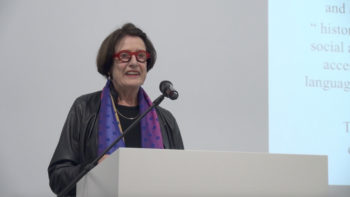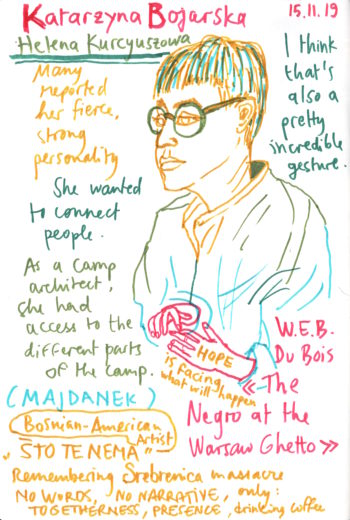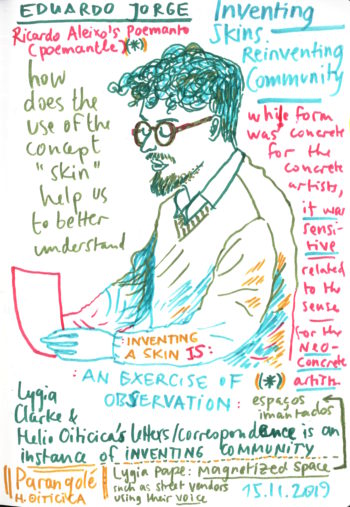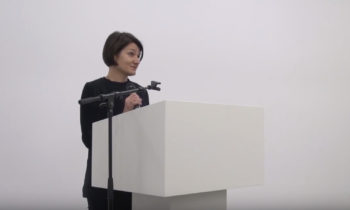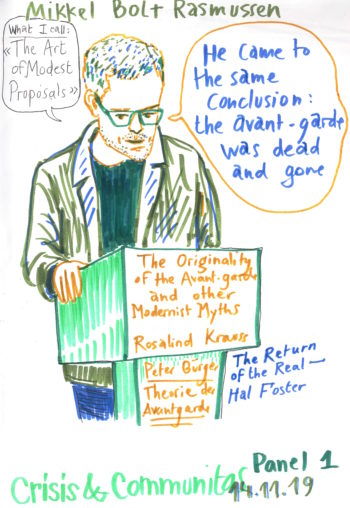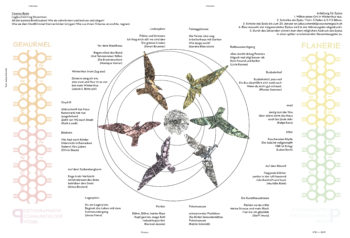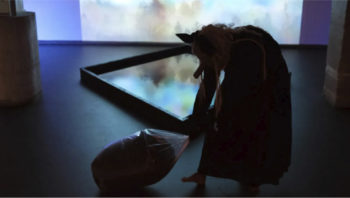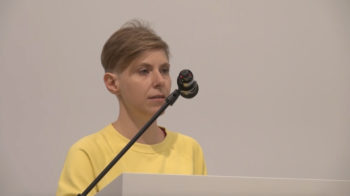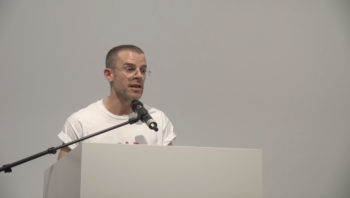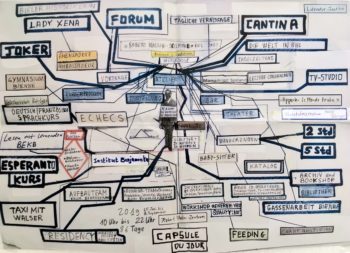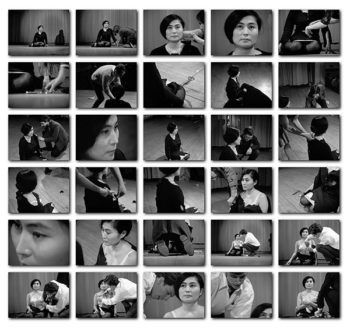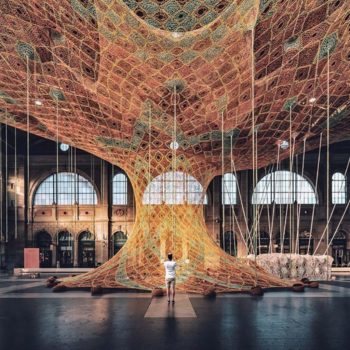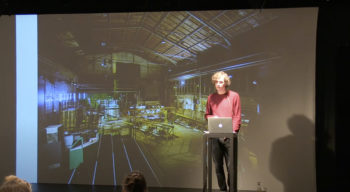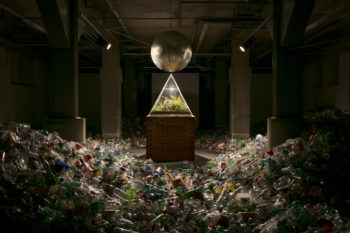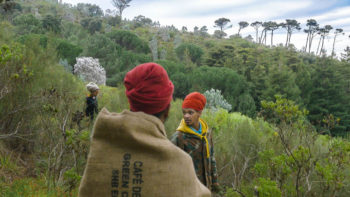Emotional Identification and Abjection. A lecture by Mieke Kolk
Text: Mieke Kolk
May 1st 2020
“Migrancy…involves a movement in which neither point of departure nor those of arrival are immutable or certain. It calls for dwelling in language, histories, in identities that are constant subject to mutation” (Chambers, 1994) Allthough the discourse on non-western arts is often still dominated by a –positive or negative – binding to western origins and […]
Read more
Divided We Stand or Revolutionary Love in the Making. A lecture by Katarzyna Bojarska
Text: Katarzyna Bojarska
Apr 26th 2020
If as Ernst van Alphen claims, «affect is the opposite of personal: it is social.» What it means is not so much that affects are not owned by individuals but rather, that their very origin is social, they are produced by and in interactions with numerous agent such as other people (their bodies most specifically) […]
Read more
Inventing Skins. Reinventing Community. A lecture by Eduardo Jorge de Oliveira
Text: Eduardo Jorge de Oliveira
Apr 27th 2020
Eduardo Jorge de Oliveira presents in his lecture two topics: Firstly, what does it mean to “invent a skin” in Literature and Art in Brazil? Secondly, how does the use of the word “skin” allow us to better understand artistic practices in reinventing communities. In the first part, he presents the concept of “Inventing Skins” […]
Read more
An Introduction to the Symposium «Crisis and Communitas»
Text: Dorota Sajewska
Apr 7th 2020
Crisis is a term increasingly heard these days – climate crisis, migration crisis, crisis of representation, identity, masculinity… Contemporary societies often react to crises by installing mechanisms of classification and order. Identitarian communities perceive themselves as an antidote to personal and social crises. On 14 and 15 November 2019, the symposium «Crisis and Communitas. Performative […]
Read more
The Avant-Garde of Destitution. A lecture by Mikkel Bolt Rasmussen
Text: Mikkel Bolt Rasmussen
Apr 22nd 2020
Within art historical scholarship it is customary to argue that the avant-garde disappeared with World War Two or at the latest in the 1960’s. As Rosalind Krauss writes in her influential essay “The Originality of the Avant-Garde”: “The historical period that the avant-garde shared with modernism is over.” Mikkel Bolt Rasmussen argues in his lecture […]
Read more
Das poetographische Projekt «Winterthur» – ein kommunitärer Epos
Text: Julius Schmidt Sandra Biberstein
Dec 20th 2019
Das poetographische Projekt «Winterthur» zielt darauf ab, eine poetische Karte Winterthurs anzulegen, um den Namen einer Stadt mit seinen Stimmen zu füllen. Gelingen soll das durch Eydus – kurze Gedichte à 5-7-5 Silben über zentrale sowie periphere Orte, die von Winterthurer*innen eingeschickt und vom Kulturmagazin Coucou monatlich abgedruckt werden. Das Projekt startete im Dezember 2018. […]
Read more
Im Dialog mit dem Hybriden
Text: Sandra Biberstein
Sep 22nd 2020
Zwischen Fremdem und Vertrautem: Für die Ausstellung «Hybride Identitäten» in den oxyd-Kunsträumen (20. August bis 4. Oktober 2020) haben die Ostschweizer Künstler*innen Olga Titus und Andy Storchenegger eine Kultstätte für eine neue, kommende Gemeinschaft erschaffen.
Read more
Polish Transformation: Community Crisis and Question of Ephemerality in Arts. A lecture by Dorota Sosnowska
Text: Dorota Sosnowska
May 1st 2020
The process of political and economic transformation which started in Poland in late eighties is narrated in terms of regaining freedom and establishing democracy. The end of totalitarian regime brought the end of censorship, of political persecution, the beginning of the free market and free flow of commodities. But on the other hand Polish transformation […]
Read more
«The function of art is to do more than tell it like it is: it’s to imagine what’s possible» – A lecture by Marc Streit
Text: Marc Streit
May 6th 2020
«With my initiatives I intend to gather people and foster real encounters – collective experiences. I consider art as a metaphorical exile, a place of resistance and action, that can and should create new perspectives and new meanings. I understand myself as a connecter, collaborator, organizer, contextualizer, producer, and host in the field of contemporary […]
Read more
Gemeinschaft auf Hügeln: Kunst und Natur
Text: Michelle Perucchi
May 27th 2020
Die jugoslawische Künstlergruppe OHO (1965-71) entschied auf dem Gipfel ihrer Bekanntheit, sich aufzulösen und in der Gemeinde Šempas in Slowenien eine Kommune zu gründen. Bojan Brecelj dokumentierte 1977 das Leben der Gemeinschaft fotografisch. Beim visuellen Einblick in das gestaltete Leben in der Natur drängen sich Assoziationen zu einer anderen Gemeinschaft auf: die Kolonie auf dem Monte Verità zu Beginn des 20. Jahrhunderts. Eine Bezugnahme in Bildern.
Read more
Kunstwerk des egalitären Austausches. Die Robert-Walser-Skulptur von Thomas Hirschhorn
Text: Léonie Koch
Jan 17th 2020
Thomas Hirschhorn schafft skulpturale Werke, die Züge der Rhizomtheorie von Gilles Deuleuze und Félix Guattari aufweisen. Das Rhizom nach Deleuze und Guattari beschreibt ein Netzwerk, in dem es keine Hierarchien und feste Positionen gibt und alles mit allem verbunden ist. Diese Charakteristika greift der Schweizer Künstler in seinen Arbeiten auf. Es sind oftmals begehbare Skulpturen, […]
Read more
Towards an Aesthetics of Common/s: Beyond Participation and its Post
Text: Magda Tyżlik-Carver
Sep 25th 2020
What is produced in the process beyond the community and the social? And what material and discursive results are created by participatory practices and artworks? Magda Tyżlik-Carver looks at Yoko Ono’s Cut Pieces and at the social sphere of social media to consider what aesthetics of common/s might be in a post-participatory age.
Read more
Kunst für das Chthuluzän?
Text: Michael D. Schmid
Feb 6th 2020
Lässt sich Donna Haraways komplexe Theorie, die sie im Buch Staying With The Trouble entfaltet, auf Kunstwerke anwenden? Die Frage wird anhand von vier Kunstwerken untersucht, in denen Aspekte von Haraways Theorie interpretativ oder experimentell entdeckt werden können – auf den Ebenen von Thema, Form und Wirkung.
Read more
Theater, Banausie, Politisierung – Kann Activism am Theater die Zuschauer politisieren – eine Keynote von Kai van Eikels
Mar 23rd 2022
«Eine performative Kunst des Kollektiven ist eine Kunst von und in Zerstreuung – eine wesentliche distributive Kunst, und dies sowohl dort, wo Performances auf den Spuren von Happening, Aktionskunst oder situationistischer Intervention die zeitliche und räumliche Integrität der Museumspräsentation und Theateraufführung aufreissen, die Szenen der Ausstellung und der Aufführung verlassen, als auch dort, wo sie […]
Read more
Im PET-Flaschenmeer. Ein Gespräch über die Ausstellung «Geometrie der Existenz»
Text: Sandra Biberstein
Jan 20th 2022
In der Ausstellung «Geometrie der Existenz», die vom 13. Januar bis am 6. März 2022 in den oxyd Kunsträumen zu sehen ist, wirft das Künstlerduo Hauser & Herzog unbequeme Fragen auf: Ab wann gerät etwas aus dem Gleichgewicht? Welche Konsequenzen hat das eigene Handeln auf die Umwelt? Soll man die Natur einsperren, um sie zu schützen? Oder wäre es besser, sie zu befreien? Im Interview mit Sandra Biberstein sprechen Peter Hauser und Sebastian Herzog aber auch darüber, warum der Humor angesichts solcher Fragen nicht verloren gehen sollte.
Read more
Bevor die Pflanzen Namen hatten. Interview mit dem Künstler Uriel Orlow.
Text: Eva Vögtli
Feb 16th 2022
Der Multimedia-Künstler Uriel Orlow befasst sich in seinem Forschungsprojekt «Theatrum Botanicum» mit den Verstrickungen zwischen Europa und Afrika, die weit in die Geschichte zurückreichen. Im Interview mit Eva Vögtli spricht er über die Verdrängung der südafrikanischen Kultur, die während der europäischen Kolonialisierung begann und bis heute anhält.
Read more
Fährten des Anthropozäns lesen
Text: Julius Schmidt
Sep 22nd 2022
Durch die Industriestadt, in der ich lebe, stromernd stolpere ich über einen Algenbrunnen in der Ecke eines besetzten Hauses; minutenlange Aufnahmen von Monokulturen an den Kurzfilmtagen; und eine Person, die in den oxyd Kunsträumen auf die globale Lage mit einer Kakerlaken-Werdung antwortet. Hat das alles etwas mit jenem Konzept zu tun, das zurzeit in der Natur- und Kulturwissenschaft debattiert wird, dem «Anthropozän»?
Read more
